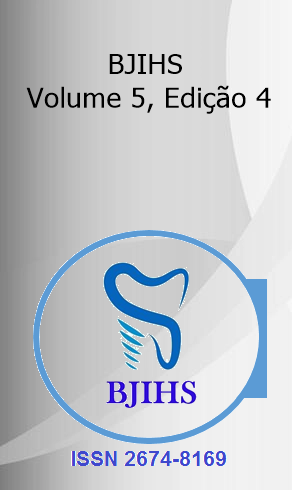Abstract
Breastfeeding is considered the first healthy lifestyle of human beings, it should be exclusive in the first six months of life and complemented until two years of age. However, this may encounter several barriers to its realization, since early weaning is influenced by several social, emotional and cultural factors. In this sense, it is the nurse's role to demystify beliefs and myths and adopt different strategies to maintain exclusive breastfeeding. The objective was to analyze the performance of nursing care in preventing early weaning and its causes. This is an integrative literature review, carried out in the BVS, SciELO, LILACS, BDENF and PubMed databases. Studies published in the last ten years were included, considering complete articles in English or Portuguese from 2013 to 2023, which responded to the objectives of the present study. In addition, duplicate, incomplete, review articles that did not respond to the objectives of the studies and are not in the time frame of the last ten years were excluded. 14 articles were selected, which were within the eligibility criteria. It was evident that the belief in the “weak” and “insufficient” bed, the need to return to extra-domestic work and the difficulty in maintaining the breastfeeding routine results in early weaning. It is concluded that the participation of the nursing professional during the breastfeeding process contributes to its being exclusive up to an ideal date, thus avoiding the introduction of other foods before the correct period.
References
ALMEIDA, L. M. N. et al. A influência do retorno ao trabalho no aleitamento materno de trabalhadoras da enfermagem. Escola Anna Nery. 26:e20210183, 2022. doi: https://doi.org/10.1590/2177-9465-EAN-2021-0183.
BATISTA, K. R. A.; FARIAS, M. C. A. D.; MELO, W. S. N. Influência da assistência de enfermagem na prática da amamentação no puerpério imediato. Saúde em Debate, 37(96):130-138, 2013.
DA SILVA, J.N. Aleitamento materno: motivos e consequências do desmame precoce em crianças. Revista Artigos.com. 20:1-7, 2020. Disponível em: <https://acervomais.com.br/index.php/artigos/article/view/4756/2635>. Acesso em: 17 set. 2022.
DE ARAÚJO, O. D. et al. Aleitamento materno: fatores que levam ao desmame precoce. Revista Brasileira de Enfermagem, 61(4):488-92, 2008. doi: https://doi.org/10.1590/S0034-71672008000400015.
DE CARVALHO, G.D.; CHIARADIA, D.L.; CHIARADIA, R Saúde oral e enfoque odontológico. In: DE CARVALHO, M.R.; GOMES, C.F. Amamentação: bases científicas. 4. Ed. Rio de Janeiro: Guanabara Koogan, 2016, cap. 6.
ERCOLE, F.F. DE MELO, L.S., ALCOFORADO, C.L.G.C. Revisão integrativa versus revisão sistemática. REME Rev. Min. Enferm. 18(1):9-11, 2014. doi: 10.5935/1415-2762.20140001
FINEOUT-OVERHOLT, E., MELNYK, B.M., SCHULTZ, A. Transformando os cuidados de saúde de dentro para fora: avançando a prática baseada em evidências no século XXI. Journal of Professional Nursing, 21(6):335-344, 2005. doi: https://doi.org/10.1016/j.profnurs.2005.10.005.
GIUGLIANI, E.R.J.; DOS SANTOS, E.K.A. Amamentação exclusiva. In: DE CARVALHO, M.R.; GOMES, C.F. Amamentação: bases científicas. 4. Ed. Rio de Janeiro: Guanabara Koogan, 2016, cap. 3.
MARQUES, E. S.; COTTA, R. M. M.; PRIORE, S. E. Mitos e crenças sobre o aleitamento materno. Ciência e Saúde Coletiva, 16(5):2461-2468, 2011.
MELO JÚNIOR, W.; SANTOS, T.M. Anatomia e fisiologia da amamentação. In: DE CARVALHO, M.R.; GOMES, C.F. Amamentação: bases científicas. 4. Ed. Rio de Janeiro: Guanabara Koogan, 2016, cap. 1.
MERCÊS, R. O.; SILVA, N. P.; RODRIGUES, M. S.; SANTANA, J. M. Fatores associados à introdução alimentar precoce em um município baiano. Revista de Ciências Médicas e Biológicas, 21(2):243–251, 2022. doi: 10.9771/cmbio.v21i2.49148
MONTEIRO, F.R.; BUCCINI, G.S.; VENÂNCIO, S.I.; COSTA, T.H. Influence of maternity leave on exclusive breastfeeding. Jornal de Pediatria, 93:475-81, 2017. doi: https://doi.org/10.1016/j.jped.2016.11.016
MONTESCHIO, C.A.C.; GAÍVA, M.A.M.; MOREIRA, M.D.S. O enfermeiro frente ao desmame precoce na consulta de enfermagem à criança. Revista Brasileira de Enfermagem. 68(5):587-93, 2015. doi: http://dx.doi.org/10.1590/0034-7167.2015680515i
NICK, M.S. A importância do aleitamento materno exclusivo nos primeiros seis meses de vida para a promoção da saúde da criança. 2011. Trabalho de Conclusão de Curso, Universidade Federal de Minas Gerais, Teófilo Otoni, 2011.
OPAS. Organização Pan-Americana da Saúde. OPAS destaca importância de participação de toda sociedade na promoção do aleitamento materno, em lançamento de campanha no Brasil. Disponível em: https://www.paho.org/pt/noticias/29-7-2021-opas-destaca-importancia-participacao-toda-sociedade-na-promocao-do-aleitamento#:~:text=No%20mundo%2C%20apenas%20quatro%20em,amamentadas%20at%C3%A9%20os%20dois%20anos. Acesso em: 15 set. 2022.
SANTOS, C.M.C., PIMENTA, C.A.M., NOBRE, M.R.C. A estratégia pico para a construção da pergunta de pesquisa e busca de evidências. Rev Latino-am Enfermagem. 15(3):1-4, 2007.
SILVA, N. O., et al. As principais causas e consequências do desmame precoce: uma revisão integrativa da literatura. Revista Científica Multidisciplinar Núcleo do Conhecimento. 8(6):125-137, 2021.

This work is licensed under a Creative Commons Attribution 4.0 International License.
Copyright (c) 2023 Elayne de Souza Pereira, Denise Alves Santos, Neemias Costa Duarte Neto, Flor de Maria Araújo Mendonça Silva, Magali Kelli Nitz, Leidiane Costa Mota Abreu, Renata Rocha Ferro, Larissa dos Santos Pinheiro, Adriana Sousa Rêgo, Marenilde Alves de Souza Melo, Lívia Moreira Lima Abas, Francisca Bruna Arruda Aragão

